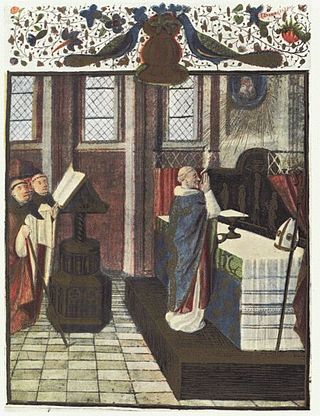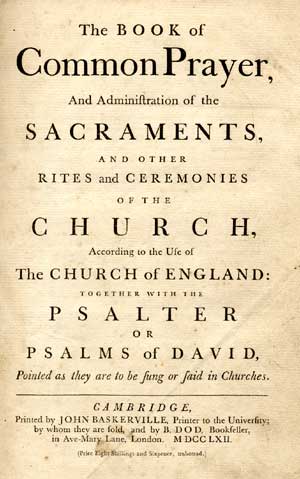
Mass is the main Eucharistic liturgical service in many forms of Western Christianity. The term Mass is commonly used in the Catholic Church, Western Rite Orthodoxy, Old Catholicism, and Independent Catholicism. The term is also used in some Lutheran churches, as well as in some Anglican churches, and on rare occasion by other Protestant churches.

An antiphon is a short chant in Christian ritual, sung as a refrain. The texts of antiphons are usually taken from the Psalms or Scripture, but may also be freely composed. Their form was favored by St Ambrose and they feature prominently in Ambrosian chant, but they are used widely in Gregorian chant as well. They may be used during Mass, for the Introit, the Offertory or the Communion. They may also be used in the Liturgy of the Hours, typically for Lauds or Vespers.

The Armenian Rite is a liturgical rite used by both the Armenian Apostolic and the Armenian Catholic churches. Isaac of Armenia, the Catholicos of All Armenians, initiated a series of reforms with help from Mesrop Mashtots in the 5th century that distinguished Armenia from its Greek and Syriac counterparts. These reforms included a retranslation of the Bible and a revised liturgy. During the Crusades and afterwards, missionary activity by the Latin Church influenced liturgical norms and induced some Armenians to join the Catholic Church. The modern Armenian Rite features elements and interpolations from the Byzantine Rite and Latin liturgical rites, with the celebration of the Eucharist emulating the Liturgy of Saint Basil.

Theophilus Lindsey was an English theologian and clergyman who founded the first avowedly Unitarian congregation in the country, at Essex Street Chapel. Lindsey's 1774 revised prayer book based on Samuel Clarke's alterations to the 1662 Book of Common Prayer inspired over a dozen similar revisions in the succeeding decades, including the prayer book still used by the United States' first Unitarian congregation at King's Chapel, Boston.

A customary is a Christian liturgical book containing the adaptation of a ritual family and rite for a particular context, typically to local ecclesiastical customs and specific church buildings. A customary is generally synonymous to and sometimes constituent of a consuetudinary that contains the totality of the consuetudines—ceremonial forms and regulations—used in the services and community practices of a particular monastery, religious order, or cathedrals. The distinctive qualities of medieval liturgical uses are often described within customaries. In modern contexts, a customary may also be referred to as a custom book.

Geoffrey Wainwright was an English theologian. He spent much of his career in the United States and taught at Duke Divinity School. Wainwright made major contributions to modern Methodist theology and Christian liturgy, and played a significant role on producing the text Baptism, Eucharist and Ministry, as a member of the Faith and Order Commission of the World Council of Churches (WCC).

The Alexandrian rites are a collection of ritual families and uses of Christian liturgy employed by three Oriental Orthodox churches, and by three Eastern Catholic Churches.
Deutsche Messe was published by Martin Luther in 1526. It followed his work Formula missae from the year 1523, pertaining to the celebration of a Latin mass. Both of these masses were meant only as suggestions made on request and were not expected to be used exactly as they were, but could be altered. The function of the mass, according to Luther, is to make people hear the word.
Paul Frederick Bradshaw, FRHistS is a British Anglican priest, theologian, historian of liturgy, and academic. In addition to parish ministry, he taught at Chichester Theological College and Ripon College Cuddesdon. From 1985 to 2013, he was Professor of Liturgy at the University of Notre Dame in the United States.
Eric J. Lott is a religious scholar who taught in Andhra Pradesh and Karnataka. Of the Indian languages, he knew Sanskrit, Telugu and Kannada.
The Book of Worship for Church and Home (1965) was the second liturgical book of The Methodist Church, replacing the 1945 book of the same name. This book was replaced in 1992 with The United Methodist Book of Worship.

The Lima Liturgy is a Christian ecumenical Eucharistic liturgy. It was written for the 1982 Plenary Session of the Faith and Order Commission of the World Council of Churches (WCC) in Lima, Peru and reflects the theological convergences of the meeting's Baptism, Eucharist and Ministry (BEM) document as expressed in liturgy. The liturgy was used again at the closing of a 1982 meeting of the Central Committee of the WCC in Geneva, Switzerland, in 1983 during the Sixth Assembly of the WCC in Vancouver, Canada, in 1991 at the Seventh Assembly of the WCC in Canberra, Australia, and, albeit unofficially, in 1993 at the fifth world conference on Faith and Order in Santiago de Compostela, Spain. Although the Eucharist has not been celebrated at WCC Assemblies after 1991 using the Lima or any other liturgy, the Lima Liturgy has been used in ecumenical events all over the world. For instance, many churches in North America use it on World Communion Sunday.
Louis Weil was an American Episcopal priest, liturgical scholar, and seminary professor. He was a member of the committee that drafted and proposed the 1979 Book of Common Prayer of the Episcopal Church.

The 1662 Book of Common Prayer is an authorised liturgical book of the Church of England and other Anglican bodies around the world. In continuous print and regular use for over 360 years, the 1662 prayer book is the basis for numerous other editions of the Book of Common Prayer and other liturgical texts. Noted for both its devotional and literary quality, the 1662 prayer book has influenced the English language, with its use alongside the King James Version of the Bible contributing to an increase in literacy from the 16th to the 20th century.

The 1604 Book of Common Prayer, often called the Jacobean prayer book or the Hampton Court Book, is the fourth version of the Book of Common Prayer as used by the Church of England. It was introduced during the early English reign of James I as a product of the Hampton Court Conference, a summit between episcopalian, Puritan, and Presbyterian factions. A modest revision of the 1559 prayer book, the Jacobean prayer book became the basis of the 1662 Book of Common Prayer, a still-authorized liturgical book within the Church of England and global Anglicanism.
Hanānā or khnana is dust collected from the burial site of a Christian saint or martyr for veneration or consumption. In the East Syriac Rite liturgies of Nestorian Christianity and successor denominations such as the Assyrian Church of the East, hanānā is used in both the anointing of the sick and Mystery of Crowning. Among Assyrian, Ethiopian, and early Latin Christians, the dust of holy persons was associated with healing powers.

Since the 18th century, there have been several editions of the Book of Common Prayer produced and revised for use by Unitarians. Several versions descend from an unpublished manuscript of alterations to the Church of England's 1662 Book of Common Prayer originally produced by English philosopher and clergyman Samuel Clarke in 1724, with descendant liturgical books remaining in use today.

The Oxford Guide to the Book of Common Prayer: A Worldwide Survey is a nonfiction reference work edited by Charles Hefling and Cynthia Shattuck which was published by Oxford University Press in 2006. The volume covered the development of the Book of Common Prayer as the dominant liturgical book of Anglicanism from the prayer book's origins in 16th-century England through to its global use and influence in the modern era, including coverage of the prayer book's influence on non-Anglican Christians. It was composed by 58 authors and was divided into more than 70 essays.

The Oxford History of Christian Worship is a 2006 nonfiction book published by Oxford University Press. Edited by Geoffrey Wainwright and Karen B. Westerfield Tucker, it comprises scholarly essays on Christian worship practices. Coverage is primarily historical, spanning from the origins of Christian worship to the modern era, with reference to a variety of denominations and traditions. It also contains discussion of the impact various theologies had upon Christian worship practices.

Free and Candid Disquisitions is a 1749 pamphlet written and compiled by John Jones, a Welsh Church of England clergyman, and published anonymously. The text advocated for reforming the Church of England to enable the reintegration of independent English Protestants, particularly through changes to the liturgies of the mandated 1662 prayer book.














